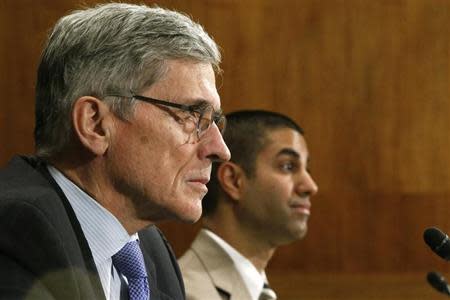U.S. regulator reasserts goal to restrict AT&T, Verizon in auction

By Alina Selyukh WASHINGTON (Reuters) - The top U.S. telecommunications regulator on Thursday reasserted his commitment to helping smaller national wireless carriers get access to valuable lower-frequency airwaves in the upcoming spectrum auction. Federal Communications Commission Chairman Tom Wheeler, in a letter to Representative John Barrow, reaffirmed his plans to restrict how much spectrum the biggest U.S. carriers, Verizon Communications Inc and AT&T Inc, could buy in the auction scheduled for mid-2015. "The Incentive Auction offers the opportunity, possibly the last for years to come, to make low-band spectrum available to any mobile wireless provider, in any market, that is willing and able to compete at auction," Wheeler wrote to Barrow. "At the same time, a priority of the auction should be to assure that companies that already possess low-band spectrum do not exploit the auction to keep competitors from accessing the spectrum necessary to provide competition," he also wrote. Wheeler's letter comes a day after AT&T, the No. 2 wireless provider, threatened to sit out the auction altogether over the regulator's proposed restrictions. Wheeler's plan would reserve part of the spectrum, up to 30 megahertz, in each market for bidding only by carriers that control less than one-third of low-frequency airwaves there. The reserve would kick in only after the auction reaches a particular trigger, which will be established in coming months, according to people briefed on the proposal. The plan is expected to be formally circulated at the FCC later this month and voted on at the May 15 public meeting. The rules would benefit the No. 3 and No. 4 nation-wide carriers Sprint Corp and T-Mobile USA as they would largely restrict Verizon and AT&T, which Wheeler said control some two-thirds of those frequencies across the country. In the letter, Wheeler argued that the smaller national carriers need a boost in getting low-band spectrum to provide more and better rural coverage, and to correct what he called "the historical accident of previous spectrum assignments." Critics have argued that Sprint and T-Mobile both had a chance to acquire more low-band spectrum in the past but for various reasons chose not to so. They also say that restricting the biggest providers amounts to regulators picking winners and losers. AT&T, in a filing disclosed on Wednesday, expressed concerns that having 30 MHz of spectrum out of bounds for some carriers may mean that in some markets, only one restricted bidder - presumably either AT&T or Verizon - would have an opportunity to buy a block of airwaves large enough to deploy LTE technology. "Such restrictions would put AT&T in an untenable position, forcing AT&T to reevaluate its potential participation in the auction," Joan Marsh, AT&T's vice president of federal regulator, said in the filing. Though AT&T's threat of auction boycott on Wednesday was seen by some observers as a bluff, lack of the carrier's participation could put a squeeze on how much cash the FCC raises in the sale of airwaves. Congress has required the FCC to raise enough money to pay back TV stations for giving up the airwaves that will be sold in the auction and fund a new $7 billion public safety network. "Companies are free to advocate the views that are in their best interest, but the public interest is not measured against the business model of one or two companies; it is measured against the ability of the market to deliver the benefits of competition to Americans in urban, suburban and rural America alike," an FCC official said on Thursday. Wheeler's letter was in response to one on Monday from Barrow, a Democrat from Georgia, and 77 other lawmakers in the House that encouraged the FCC as it prepares for the auction. (Reporting by Alina Selyukh; Editing by Marguerita Choy)
